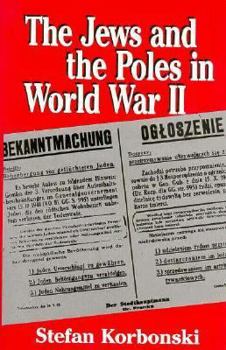Jews and the Poles in World War II
No Synopsis Available.
Format:Hardcover
Language:English
ISBN:0870525913
ISBN13:9780870525919
Release Date:January 1989
Publisher:Hippocrene Books
Length:136 Pages
Weight:0.76 lbs.
Dimensions:0.7" x 5.8" x 8.8"
Customer Reviews
2 ratings
Polish government after World War 2.
Published by Thriftbooks.com User , 15 years ago
An excellent account by a survivor of Communist take over and political shuffling immediately after World War 2 in Poland. Teriffic insight and historical account of power. Suprising historical account.
A History of American Jewish Polonophobia Through the 1980's
Published by Thriftbooks.com User , 18 years ago
Although this book was written almost 20 years ago, it retains its significance. Its author was one of the last surviving leaders of the Polish Underground state under German Nazi occupation, and was honored at Yad Vashem for his aid to Jews (p. 104). He not only gives a firsthand account of Polish-Jewish relations during WWII, but also traces many mischaracterizations of this history in the American press through 1989. The informed reader can also appreciate how little has changed since then. Poles have at times been unfairly blamed for segregating Jews into ghettos. In actuality, before WWII, most Jews chose to live apart from Poles. Nor does this self-segregation necessarily imply discrimination by the majority. Korbonski cites the Zionist Jabotinsky (Jabotinski), who compared the self-segregation of Polish Jews to that of Europeans living in Shanghai, China (p. 8). Before WWII, the National Democrats (the nationalists, Endeks, or Endecks) believed that Poland's Jews were an inimical factor in Polish life owing to the non-assimilated state of most of them, along with their dominance of the economy. But whether or not in agreement with them, one has to recognize that the Endeks or Endecks, contrary to common portrayals, didn't represent the majority of Polish opinion. Korbonski estimates that less than 20% of the Polish population supported them (p. 19). After WWII, a very disproportionate share of the Communist government forced on Poland was Jewish. In time, many of these Jews emigrated to the US and misrepresented themselves as victims: "The ten years of Jewish rule in Poland could not be easily forgotten. It was an era of the midnight knock at the door, arbitrary arrests, torture, and sometimes secret execution. Most of those responsible for that reign of terror left Poland and upon arrival in the West represented themselves as victims of Communism and anti-Semitism--a claim which was readily believed in the West and earned them the full support of their hosts." (p. 86). Going further, Korbonski attributes the 1968 purge of Jews from the Polish Communist Party to a Soviet reaction to the Israeli victory in the June 1967 war and to popular Polish support for the Jewish side at the time (p. 85). Polish cardinal Stefan Wyszynski offered a prayer for Israel on June 5, 1967 (p. 92). Among leading Polish émigrés, General Wladyslaw Anders sent a letter of congratulations to Israeli General Moshe Dayan for his brilliant victory, to which Dayan responded favorably (p. 92). Many recurrent Polonophobic themes, which first started emanating from certain sectors of the American Jewish population decades ago, are addressed and refuted by Korbonski. These include accusations of Polish collaboration with the Germans in the extermination of Poland's Jews, universal Polish indifference to Jews, etc. Again, how disappointingly little has changed since then! Korbonski shows that there was much more Polish aid to the Warsaw Ghetto Uprising than common





